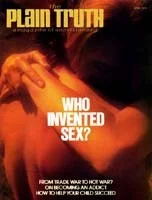After Rod Meredith's death, LCG made a big-to-do of publishing his master's thesis from Ambassador College in 1956. The title of this 138-page booklet is "The Plain Truth About The Protestant Reformation." On the back cover, it says, "Before his death in 2017, he began editing and lightly revising his thesis for a brand-new audience."
After reading it, I had to wonder why there was not a single person in the boardroom who said, "Given our own church history, would it be wise to publish this?"
Maybe one or more did. And maybe that is why they state it is for a "brand-new audience." But I couldn't help but think how this book will not bode well for the old audience and those in-the-know on the history of Herbert W. Armstrong and his Worldwide Church of God cult.
Certainly, we are aware of the arrogance that exudes from the AC elite running all the splinters. Quite possibly, Gerald Weston settled the matter by saying something like, "It is true that the booklet reads as if it was our own putrid history but it is not likely our sheep have the mental capacity to make such a connection. After all, we are selling this to the generation born in this church after 1986. Surely, our youth won't scan the internet to learn the truth about the Church their parents birthed them into. And any of their parents who do happen to be able to make the connection have been embroiled in the lie for so long that the cognitive dissonance will not allow them to challenge it." (You read that with Weston's voice in your head, didn't you?)
What I want to do is just review the booklet and point out, in particular, the ways the Protestant Reformation mirrors the history of HWA and the WCG. By doing so, I will prove that Roderick C. Meredith was indeed, a prophet. His thesis is, in fact, a not-so-encrypted prophecy of who HWA would prove to be and what his cult would become over the next 30 years. (Save the stupid comments. I'm being facetious about the prophet thing.)
As is true of just about every argument made in the churches of God, RCM plants his whole thesis on a straw man. He asks the same question, chapter after chapter, "Was the Reformation a return to the faith once for all delivered?" He then sets his own prophetic trap by saying in the close of chapter one pertaining to his central question above:
"This is the question that should burn itself into the minds and hearts of all thinking men and women, because the final answer to this question will determine -to a great extent- the real meaning of the religious division and confusion of our time."
He also states at the beginning of his thesis that, "We must weigh any religious denomination or movement in the balance of Christ's prophetic saying: 'You will know them by their fruits.'"
Before moving on from his opening chapter, I do want to share this rather bizarre quote from page 20:
"We need to bear in mind that these men [pre-reformation reformers] -and Luther, Zwingli, Calvin and their associates-had all been reared from childhood in Roman Catholic doctrine and practice. They had been taught nothing else, and since there were practically no religious books or Bibles available in the common tongues , they knew of little else than the Roman Catholic faith, ceremonies, rituals and traditions. Therefore, it was virtually impossible for them to objectively look at the religious system in which they had been reared and compare it to the beliefs and practices of Jesus Christ and the inspired New Testament Church."
Wow! So, let me get this straight. They could not approach the Bible objectively because they were Catholics but apparently, former Methodist, Gilbert Cranmer was able to found the Sabbath-keeping Church of God. And of course, Herb, of Quaker stock, and self-evident narcissist and incestuous child rapist, had the "objectivity" to get baptized by a Baptist preacher, collect minister checks from COG7D for 5-7 years, then start his own (information marketing business) religious cult, cherry-picking ideas from others who thought them, built by already impoverished dupes who kept sending him money even as his false prophecies piled up on radio. Makes sense.
In the 2nd chapter, his first concern about the Catholic church was the Pope's "insatiable craving for money." (You can't make this stuff up.)
The Roman pontiffs were able to extract this money from their unwary subjects by various means concealed under the appearance of religion." -p.24
He goes on to say that much of early reform and revolt was from German nobility who wished to free themselves from "papal taxation." Later, he calls it a "ruthless financial policy." But what RCM was very careful not to call it was "tithes" which is exactly what it was. The Apostolic church certainly never collected tithes as it was understood that it was done away with the Old Covenant. It wasn't until the 500's that the Catholic Church attempted to collect tithes in order to pay for their ornate cathedral buildings but was rejected. The Catholic Church finally succeeded in duping Europe into tithing in 777. The sick irony is, of course, that WCG went on to demand 30%+ in tithes and offerings. As far as I know, that record of financial extraction hasn't been surpassed until Dave Pack declared 100%.
In chapter 3-5 (and a few other places in the booklet) is a personal attack on Martin Luther. Here is a list of character traits he brings out:
- a desire to escape authority and obedience
- periods of exaltation and depression
- moodiness
- dogged by perpetual guilt
- deep sense of personal inadequacy
- spiritually drunk
- practiced eisegesis
- rejected or ignored Scriptures he disagreed with
- justified using violence
- became enmeshed in politics
- condoned bigamy
- chose division instead of fellowship over petty differences
- stubborn and self-willed
- lived life as though above the law or what he taught others
- inconsistent and self-contradictory
- proclivity to pick-n-choose from multiple sources to formulate a private system of belief
Obviously, anyone with first-hand experience with or read about HWA knows RCM is describing his very own "spiritual papa." Martin Luther and Herbert Armstrong suffered from Narcissistic Personality Disorder. One noteworthy reference on the subject is a book by Sam Vaknin called, "Malignant Self Love" with a chapter addressing religious leaders. Another is a video on Youtube by Dan Rogers covering the Adventist roots of Grace Communion International. You can watch it below.
Chapter 6 is spent attacking John Calvin for essentially the same character traits as Luther. He does spend more time on his theology but also emphasizes his violent character in enforcing very strict rules of life and carrying out acts of torture and murder on sinners. Sharing more narcissistic traits with Luther and Herb, Calvin was never wrong, refused to change anything he committed to and justified the death of fellow Christians over extreme petty doctrinal differences. HWA (as far as I know) never advocated for the death of anyone openly but one has to realize, placing a narcissist in the right setting where he knows he can get away with it, will indeed stoop to any heinous sin, whether it be fraud, sexual immorality, theft, torture or murder. In addressing the sheer harshness of Luther and Calvin, RCM concludes by saying:
"This very dominance of Luther and Calvin was, in many ways, detrimental. It led men to accept without question their doctrine and practice-never thinking to prove these ideas by the holy word of God...Protestants often have tended to make infallible popes out of Luther, Calvin and the other early reformers."
Is it just me or does Herb deserve a seat at the same table? For Herb's-sake, the man has been dead for 34 years and if you question even the pettiest of doctrines in the churches of God openly, you are red-flagged by both minister and some members as a rebel, heretic, dangerous, etc.
And on p.107, he says:
"Before gaining political power, the reformers all insisted upon the inalienable right of every Christian to search the Bible for himself and to judge its teachings independently. But once they were in power, woe be to the Catholic, the Anabaptist, or to any other who continued to insist upon this inalienable right!"
The COG7D was established with Congregational governance. By the time HWA came into contact with that church, Andrew Dugger was throwing his weight around, attempting to centralize more power over the church to himself. Narcissists, when not in charge, are all for rebellion, revolution, anarchy or whatever it takes to dismantle power and control. One of Herb's better articles was on church government in 1939. It is clear that he was absolutely opposed to top-down hierarchical government and made a decent case for it being unbiblical. But as some know, by 1979, HWA had just finished using RCM and RFM as his toady henchmen to rid HWA of his "liberal" enemies and secure his papal status in his Armstrongian Catholic church.
RCM is very careful not to attack Roman Catholic government throughout the book, but instead, zeros in on the problematic effects of that government. In his mind, the government wasn't the problem, it was the people. The Catholics are devoid of God and His Holy Spirit, therefore they could not do good. But WCG was Spirit-filled and Spirit-led by "holy" men and therefore "holy" men can make any government function properly.
RCM candidly admits in his Global Church of God government booklet that it was he and Herman Hoeh who convinced HWA in 1953-54 that top-down, hierarchical, one-man rule is the New Testament government. In many ways, RCM played right into the narcissist monster in hiding, feeding him all the narcissistic supply he needed to continue moving forward, his money-making cult venture.
[An interesting side note: he dedicates a page to the lust of nationalism that was sweeping the continent of Europe alongside the Reformation. What he obviously didn't catch was the fact that what started out as a theological theory in England at the time, because of the Reformation, evolved into British-Israelism.]
"It is an undeniable fact the 'fruit' of the Protestant Reformation is the divided 'churchianity' of our day. We must say at the outset that this is bad fruit. Paul tells us that the Spirit of God produces unity-not division." -p.104
Just imagine how easy this was to say in 1956 and not have a clue that what he put in motion with Herman Hoeh in 1954 would lead to what we have today! Here is another easy thing to say in 1956 in the last chapter of the booklet, having no clue what the next 30 years would bring:
"We are forced to conclude that the Reformation certainly did not lead men to the Bible...nor return men to the faith which was once for all delivered...We must recognize that the leaders of the Reformation were only transferring authority to themselves within the same pagan system."
This is exactly what Rod Meredith and Herman Hoeh did in 1954. The two most important doctrines every false church must have in place, in direct opposition to what Christ required in Matthew 20:20-28, in order to draw all power, control, and authority to itself is:
- top-down, hierarchical governance
- tithing
I don't care if all your other doctrines, dogmas and traditions are spot on, you are disqualified on these two false doctrines alone. Period. Spirit-filled or not, men are not qualified to practice God's hierarchical government (He does indeed have in Heaven) because we are not God. The history of HWA and his cult business is ample proof that this is simply an undeniable truth. The history of man proves this undeniable truth.
The back cover claims there were light revisions made. If I had to guess, these two comments at the very end were probably part of that:
"The true church will be a body of people continually growing into more complete truth and knowledge and deeper understanding!...For decades, this church has dared, as no other church on earth, to proclaim definite, specific prophetic events to occur-and they have been happening!"
Seriously? The only thing remotely close to being prophetically accurate from the churches of God is this booklet I facetiously pointed out at the beginning. Growth? The churches of God are in suspended animation and have been for at least since Herb drew his last breath, but arguably longer. Some members and their children in the churches of God are actually growing in truth, knowledge and understanding. It is the AC elite that refuses. The churches of God are filled with good people who want to transition from a cult to a church but I wonder if the long shadow of a dead gnostic narcissist will forever prohibit such a jubilee.
I will just conclude with a quote from a Protestant reformer, John Knox, whom RCM quotes on pg. 3:
by: Stoned Stephen Society"All worshipping, honouring, or service of God invented by the brain of man in the religion of God without His own express commandment is idolatry...it shall nothing excuse you to say, we trust not in idols, for so will every idolater allege; but if either you or they in God's honour do anything contrary to God's word, you show yourself to put your trust in somewhat else besides God, and so are idolaters, Mark, brethren, that many maketh an idol of their own wisdom or phantasy; more trusting to that which they think good not unto God."















